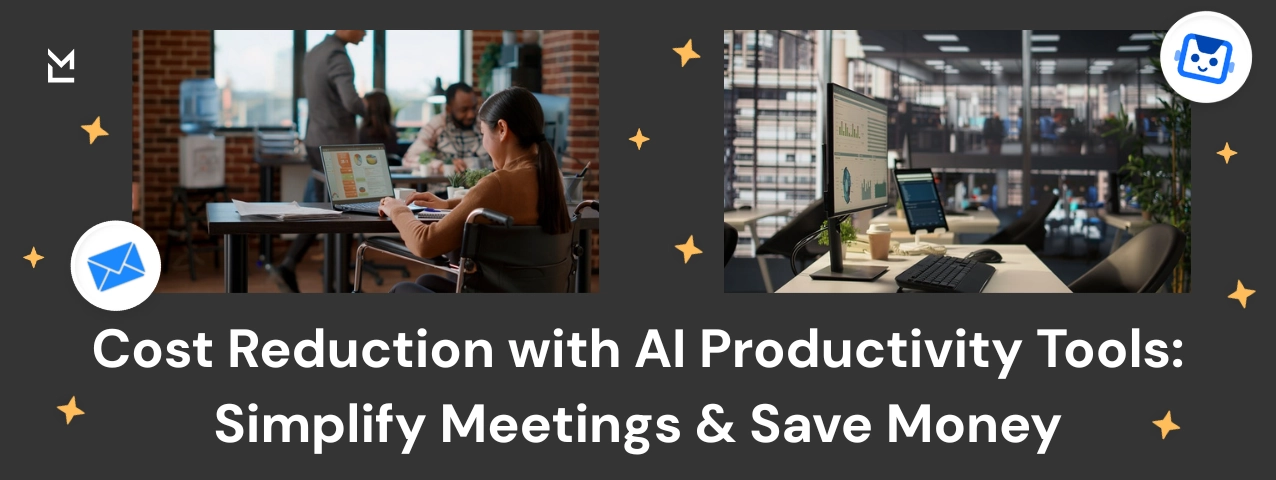
Written with help from MinutesLink - free AI meeting notetaker for online meetings.
Written with support from MinutesLink — a free AI notetaker for online meetings.
In today’s economy, cost reduction isn’t just a finance team concern - it’s a survival strategy. Companies are looking for smarter ways to reduce costs without sacrificing quality. That means rethinking how teams collaborate, document, and make decisions. It means asking hard questions like: Do we really need five different services to run one meeting? Are we paying for features we never use? Is our tool stack helping us move faster - or slowing us down?
The truth is, many businesses are bleeding money through fragmented workflows. Every time someone switches apps to find a note, assign a task, or review a transcript, they lose time. That time adds up. And when multiplied across departments, it quietly inflates business expenses.
Let’s zoom in on something simple: a meeting. You gather your team, discuss priorities, make decisions. Someone takes notes in Google Docs. Another person logs action items in Notion. A third uploads the transcript to Slack Canvas. Then the meeting ends - and the information scatters. No one’s sure where the final version lives. Tasks get missed. Context gets lost. And next week, you’re having the same conversation again.
This isn’t just inefficient. It’s expensive. It drains focus, delays execution, and creates confusion. And when meetings are the heartbeat of your organization, that kind of chaos becomes a serious cost.
In early 2024, a mid-sized SaaS company decided to confront this problem head-on. They were using four different productivity tools to manage meetings, notes, tasks, and transcripts. It worked - technically. But it was messy, expensive, and hard to scale.

So they made a change. They replaced their stack with MinutesLink, a platform designed to simplify meeting documentation and reduce costs.
The shift was immediate. Meeting minutes became centralized and searchable. Word-for-word transcripts captured every detail. Action items were automatically tagged. Speaker tracking made it easy to follow who said what. Instead of bouncing between apps, the team had one place to manage everything.
And the results weren’t just anecdotal. Within the first quarter, the company saw a 37% drop in costs related to productivity tools. But the real win was clarity. Managers spent less time chasing updates. Projects moved faster. New hires onboarded with ease. And meetings stopped being a black hole for time and energy.
MinutesLink didn’t try to be everything. It focused on doing a few things exceptionally well: capturing conversations, organizing decisions, and making it easy to act on them. That clarity helped the company reduce costs and improve team alignment. No more bouncing between apps. No more wondering where the latest update lived. Just clean, searchable data - all in one place.
The platform’s ability to maintain accurate documentation without extra effort was a game-changer. Instead of relying on memory or scattered notes, teams could revisit key points, track progress, and stay focused. That’s not just convenient - it’s essential for maintaining efficiency.
One of the most underrated benefits? Onboarding. With MinutesLink, new hires could access past meeting minutes, review key points, and understand project context without needing a dozen walkthroughs. That saved time, reduced frustration, and helped maintain team momentum.

Instead of starting from scratch, new employees could jump into conversations with confidence. That kind of clarity isn’t just helpful - it’s essential. Especially when onboarding is a recurring cost that companies often overlook.
Need to revisit a decision from a board meeting six months ago? With traditional tools, good luck. With MinutesLink, it’s a quick search. That ability to access details instantly is a game-changer - especially when accuracy matters.
Whether it’s a sales discussion, a supplier negotiation, or a strategic plan, having clean, searchable documentation helps businesses stay aligned and reduce costs tied to miscommunication. It also helps maintain trust - internally and externally.
Most companies separate tools by function. One for planning. One for documentation. One for meetings. It makes sense - until it doesn’t. Because when information is split across platforms, context gets lost. And when context gets lost, so does money.
Maintaining multiple services also means maintaining multiple workflows. That’s more training, more confusion, and more spending. Reducing costs starts with reducing complexity. And that means choosing tools that support the entire process - not just parts of it.
A good productivity tool doesn’t just offer features - it offers clarity. It helps teams capture key points, manage tasks, and stay focused. It supports the process, not distracts from it.

MinutesLink does exactly that. It doesn’t try to replace every app. It replaces the noise. And in doing so, it helps businesses reduce costs, improve documentation, and stay aligned.
Cutting costs isn’t just about saving money. It’s about improving decisions, speeding up execution, and reducing stress. When your tools work with you - not against you - everything gets easier.
MinutesLink helped companies streamline their meetings, support their teams, and simplify their workflows. That’s not just a win for operations - it’s a win for the bottom line.
“We didn’t realize how much we were spending until we switched. MinutesLink gave us clarity - and cash back.” - Operations Lead, SaaS company
“Our team finally stopped asking ‘Where’s that note?’ every five minutes.” - Project Manager, Marketing agency
For these managers, the shift wasn’t just about convenience - it was about real business savings. By replacing multiple productivity tools with one streamlined system, they reduced costs, improved meeting minutes quality, and brought focus back to the team. The ability to access word-for-word transcripts, track action items, and maintain documentation in one place helped them cut through the noise and finally feel in control of their process.
Switching to a single tool like MinutesLink had a domino effect on how teams communicated. Instead of jumping between platforms to piece together conversations, they could focus on what mattered: the actual content of the meeting. Having one clear thread of documentation - from agenda to action items to word-for-word transcript -meant participants felt more present, more engaged and less distracted by the logistics of note taking. That kind of clarity doesn’t just save time - it changes how people show up to meetings.

And when meetings become more intentional the whole organisation benefits. It’s not just about saving time - it’s about creating space for better decisions, stronger collaboration and more meaningful outcomes.
Beyond internal operations, the impact extended to external relationships too. Clients, suppliers and partners noticed the difference. When businesses can share meeting minutes, highlight key points and be transparent in every conversation, trust grows. And trust as every manager knows is one of the most valuable currencies in business. By reducing costs tied to miscommunication and improving documentation, businesses using productivity tools found themselves not only saving money - but also building their reputation. In a competitive market that’s hard to quantify but impossible to ignore.
In a world full of productivity tools, simplicity is a competitive edge. MinutesLink helped businesses reduce costs, improve documentation, and support new hires - all while replacing four separate services.
If your company is juggling too many tools, struggling to maintain clarity, or looking for ways to reduce business expenses, it might be time to rethink your stack. MinutesLink isn’t just another service - it’s a smarter way to manage meetings, decisions, and documentation. And in the pursuit of cost reduction, that kind of clarity is priceless.
Productivity tools are apps or platforms that help teams stay organized and work smarter. They handle tasks, meeting minutes, and project tracking, so everyone knows what to do and when. Using them reduces confusion, prevents things from falling through the cracks, and helps teams focus on what really matters.
A business savings strategy is all about cutting unnecessary costs and making resources work harder for you. By identifying wasteful spending, consolidating tools, and optimizing processes, companies can free up money and time to invest in growth, innovation, or employee development.
Cost reduction is the process of lowering expenses without compromising quality. This can involve replacing multiple productivity tools with one integrated system, automating repetitive tasks, or streamlining workflows. The goal is to save money, improve efficiency, and allow teams to focus on high-impact work.
Accurate meeting minutes capture all key points, decisions, and action items, so nothing is lost or misunderstood. They keep teams accountable, simplify follow-ups, and ensure everyone is on the same page - especially useful for board meetings, cross-department discussions, or legal documentation.
A new hire checklist organizes onboarding step by step, introducing essential productivity tools and company processes. It helps new employees understand expectations quickly, reduces mistakes, and lets them start contributing effectively from day one, which keeps the team running smoothly.